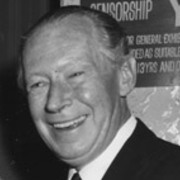
Geoffrey Scott
Some film producers wouldn't know a sound boom from a booster. Not Geoffrey Scott: the longtime manager of the National Film Unit was fascinated with technology. Scott's career ran long enough for him to help oversee the transition from silent films to talkies, and later the growth of the NFU to become the country's biggest production house.
(Alfred) Geoffrey Scott was born in Wellington in 1908. Before he was 10, he'd persuaded his dad to buy him a 35mm film projector. At 15 he was hired by an Auckland orchestra. At 18 he was studying engineering in Auckland, financed partly by playing piano accompaniment during silent movies for theatre entrepreneur Henry Hayward (uncle of pioneer filmmaker Rudall Hayward).
Scott's technical skills and enthusiasm for cinema saw him move through a range of movie-related jobs. He worked as projectionist, helped Rudall Hayward with sound on his feature film Rewi's Last Stand, and when talkies arrived helped install sound equipment in movie theatres.
In 1929 Scott got a job with Auckland Cinemas Limited. Later he managed cinemas and bought and distributed films for the company.
In the early 1940s, Scott's wife Joyce saw an advertisement for the new National Film Unit in Wellington. The couple moved south. The government had been involved in filmmaking for 17 years. Using inherited studios in the Wellington suburb of Miramar, the newly formed Film Unit set about making regular newsreel the Weekly Review, as part of efforts to publicise the war effort.
By 1943 Scott was the NFU's sound director. Two years later he was appointed technical director, and set about upgrading the organisation's limited equipment, which initially included only three cameras. In 1950 NFU boss Stanhope Andrews quit the job, frustrated by a rising tide of bureaucracy and approval processes. Scott took over as NFU manager, and would remain at the helm until compulsory retirement 23 years later.
Scott faced a challenge early on when he was summoned to the offices of new Prime Minister Sidney Holland, whose cost-cutting and seeming disinterest in the Unit was one of the reasons Andrews had left the building.
Holland ordered Scott to stop production of the unit's Weekly Review shorts, annoyed by what he perceived as their "leftist tendencies". Scott came up with the long-running, magazine-style Pictorial Parade instead. Dominion Post obituarist Peter Kitchin argued that Scott realised he needed allies to demonstrate that he and the NFU were politically neutral, "and he took it upon himself to court politicians and heads of government departments rather than expose his staff to examination".
Scott demonstrated courage, as well as political nouse. He hired filmmaker Ron Bowie, who had been banned from taking public service jobs after five and a half years internment as a conscientious objector. The two would produce many NFU films together, including Academy Award-nominated Antarctic doco One Hundred and Forty Days Under the World (1964). It wasn't Scott's first Oscar nomination; Brian Brake's Snows of Aorangi had gone up for Best Live Action Short, eight years before — the first Kiwi Oscar nomination.
Under Scott's leadership, the NFU grew to become New Zealand's biggest production house, with a range of modern equipment. After earlier having refused to process footage for ex-NFU staffmember Roger Mirams' independant feature Broken Barrier (1952), by the 60s the Unit was processing film from outside sources like advertising agencies and television: he felt that the volume of film processed for television was the Unit's biggest headache.
Scott also developed networks with the Walt Disney Company (who were at one point interested in involving the NFU in its natural history work) and the British movie powerhouse run by J. Arthur Rank. Scott played a big hand in NFU/Rank Organisation co-production British Empire Games 1950, the Unit's first feature-length documentary.
He also helped secure government funding for three-screen spectacular This is New Zealand (1970), which won impressive audiences during expo screenings in Japan. After hearing about early design concepts for the national pavilion, Scott argued that he could portray New Zealand more effectively with 20 minutes of film than static displays of industry and primary produce. He later claimed that it was his idea to have the film projected across three screens, and that Industry and Commerce Minister Jack Marshall told him that the film deserved to be seen by Kiwi audiences after its success in Japan.
This is New Zealand opened at Wellington's Embassy Theatre. "It opened to crowds waiting in queues all the way up Kent Terrace. The theatre was full, and the next session was full, with people waiting. The five, six and seven pm sessions were also full and it ran, instead of an expected couple of weeks, 13 weeks."
Scott was made a Member of the British Empire in the 1968 New Year's Honours, and in 1972, a year before retiring from the film unit, he got an OBE.
Scott outlived the Film Unit, which was sold off in 1990. He died on 1 May 2006. Over the years, he had continued to welcome movie industry figures and politicians to his Wellington home, where he entertained them with silent movies, usually providing the piano accompaniment himself.
Profile updated on 30 November 2022
Sources include
Stanhope Andrews, 'The National Film Unit' - Here and Now, December 1952 (Volume 3, No 3), page 7
Julie Benjamin, 'Film Pioneer' (Biography of Stanhope Andrews) - Onfilm, April 1990 (Volume 7, No 3), page 36
John O’Shea, Don’t Let it Get You: Memories - Documents (Wellington: Victoria University Press, 1999)
Peter Kitchin, 'Credits roll for NZ film producer' (Obituary) - Dominion Post, 11 May 2006, page B9
Unknown writer, 'The Birth of 'This is New Zealand'' (Interview) - Flicks & Pix magazine, original publication date unknown. Republished on website in70mm, 27 February 2009